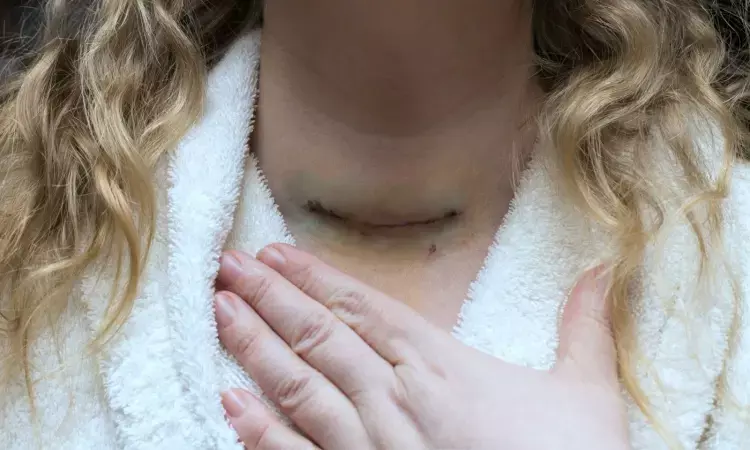- Home
- Medical news & Guidelines
- Anesthesiology
- Cardiology and CTVS
- Critical Care
- Dentistry
- Dermatology
- Diabetes and Endocrinology
- ENT
- Gastroenterology
- Medicine
- Nephrology
- Neurology
- Obstretics-Gynaecology
- Oncology
- Ophthalmology
- Orthopaedics
- Pediatrics-Neonatology
- Psychiatry
- Pulmonology
- Radiology
- Surgery
- Urology
- Laboratory Medicine
- Diet
- Nursing
- Paramedical
- Physiotherapy
- Health news
- Fact Check
- Bone Health Fact Check
- Brain Health Fact Check
- Cancer Related Fact Check
- Child Care Fact Check
- Dental and oral health fact check
- Diabetes and metabolic health fact check
- Diet and Nutrition Fact Check
- Eye and ENT Care Fact Check
- Fitness fact check
- Gut health fact check
- Heart health fact check
- Kidney health fact check
- Medical education fact check
- Men's health fact check
- Respiratory fact check
- Skin and hair care fact check
- Vaccine and Immunization fact check
- Women's health fact check
- AYUSH
- State News
- Andaman and Nicobar Islands
- Andhra Pradesh
- Arunachal Pradesh
- Assam
- Bihar
- Chandigarh
- Chattisgarh
- Dadra and Nagar Haveli
- Daman and Diu
- Delhi
- Goa
- Gujarat
- Haryana
- Himachal Pradesh
- Jammu & Kashmir
- Jharkhand
- Karnataka
- Kerala
- Ladakh
- Lakshadweep
- Madhya Pradesh
- Maharashtra
- Manipur
- Meghalaya
- Mizoram
- Nagaland
- Odisha
- Puducherry
- Punjab
- Rajasthan
- Sikkim
- Tamil Nadu
- Telangana
- Tripura
- Uttar Pradesh
- Uttrakhand
- West Bengal
- Medical Education
- Industry
Postoperative Radioiodine not beneficial in Low-Risk Thyroid Cancer patients: ESTIMABL2 Trial

France: A recent study has found that a non-radioiodine follow-up strategy is non-inferior to postoperative radioactive iodine (131I) treatment in patients with low-risk differentiated thyroid cancer. The study was published online in The Lancet Diabetes & Endocrinology on November 22, 2024.
"The group that did not receive radioactive iodine had a 93.2% event-free rate, while the 131I group had a slightly higher rate of 94.8%. These results demonstrate that withholding radioactive iodine after surgery did not negatively affect patient outcomes, offering a less invasive approach that enhances overall management," the researchers reported.
The ESTIMABL2 trial, a multicenter randomized phase 3 study involving patients with low-risk differentiated thyroid cancer (pT1am or pT1b, N0 or Nx), demonstrated the non-inferiority of a follow-up strategy that excluded radioactive iodine (131I) administration compared to postoperative 131I treatment after 3 years of follow-up. The study author Prof Sophie Leboulleux, University Paris-Saclay, Paris, France, and colleagues present the results of a pre-specified analysis conducted after 5 years of follow-up.
For this purpose, the researchers randomly assigned patients who underwent total thyroidectomy with or without prophylactic neck lymph node dissection and had no postoperative suspicious findings on neck ultrasonography to either the no-radioiodine group or the radioiodine group (1.1 GBq-30 mCi of radioactive iodine after recombinant human thyrotropin-stimulating hormone). Follow-up included annual thyroglobulin and thyroglobulin antibody measurements during levothyroxine treatment, along with neck ultrasonography in odd-numbered years.
An event was defined as abnormal 131I uptake on a post-treatment whole-body scan requiring additional treatment, abnormal neck ultrasonography, elevated thyroglobulin levels, rising thyroglobulin antibody titres, or a combination. Non-inferiority was established if the proportion of patients without an event in one group compared to the other at 5 years post-randomization differed by no more than -5%, and the confidence interval did not overlap this threshold.
Key findings:
- A total of 776 patients were enrolled in the study, with 642 (82.7%) female and 134 (17.3%) male participants. The median age was 52.9 years.
- Of the enrolled patients, 698 were evaluable at 5 years.
- The proportion of patients without events was 93.2% in the no-radioiodine group and 94.8% in the radioiodine group, resulting in a difference of –1.6%.
- Events included 11 cases of structural or functional abnormalities and 31 cases of biological abnormalities.
"The non-inferiority of a follow-up strategy, compared to postoperative 131I administration, in low-risk thyroid cancer, previously demonstrated at 3 years, was reaffirmed at 5 years. This confirms that there is no disadvantage in managing these patients without postoperative ablation," the researchers concluded.
Reference:
Leboulleux S, Bournaud C, Chougnet CN, Lamartina L, Zerdoud S, Do Cao C, Catargi B, Dygai I, Kelly A, Barge ML, Vera P, Rusu D, Schneegans O, Roux J, Raymond P, Benisvy D, Eberle MC, Bidault S, Nascimento C, Bastie D, Giraudet AL, Bardet S, Le Moullec N, Roudaut N, Drui D, Godbert Y, Zalzali M, Drutel A, Morel O, Velayoudom FL, Al Ghuzlan A, Schlumberger M, Buffet C, Borget I. Thyroidectomy without radioiodine in patients with low-risk thyroid cancer: 5 years of follow-up of the prospective randomised ESTIMABL2 trial. Lancet Diabetes Endocrinol. 2024 Nov 22:S2213-8587(24)00276-6. doi: 10.1016/S2213-8587(24)00276-6. Epub ahead of print. PMID: 39586309.
Dr Kamal Kant Kohli-MBBS, DTCD- a chest specialist with more than 30 years of practice and a flair for writing clinical articles, Dr Kamal Kant Kohli joined Medical Dialogues as a Chief Editor of Medical News. Besides writing articles, as an editor, he proofreads and verifies all the medical content published on Medical Dialogues including those coming from journals, studies,medical conferences,guidelines etc. Email: drkohli@medicaldialogues.in. Contact no. 011-43720751


